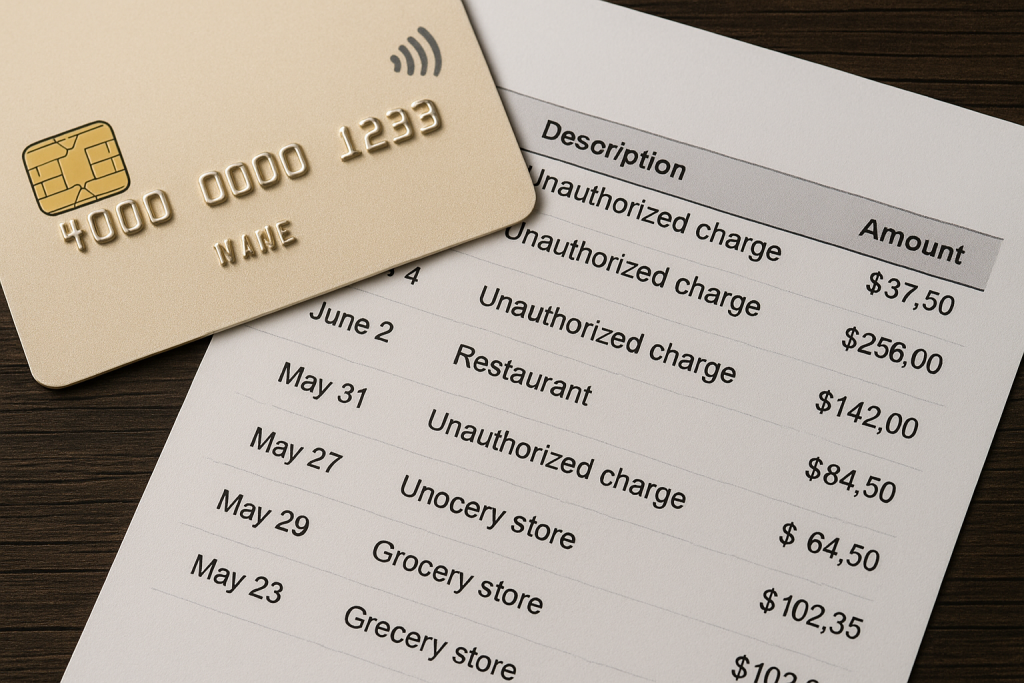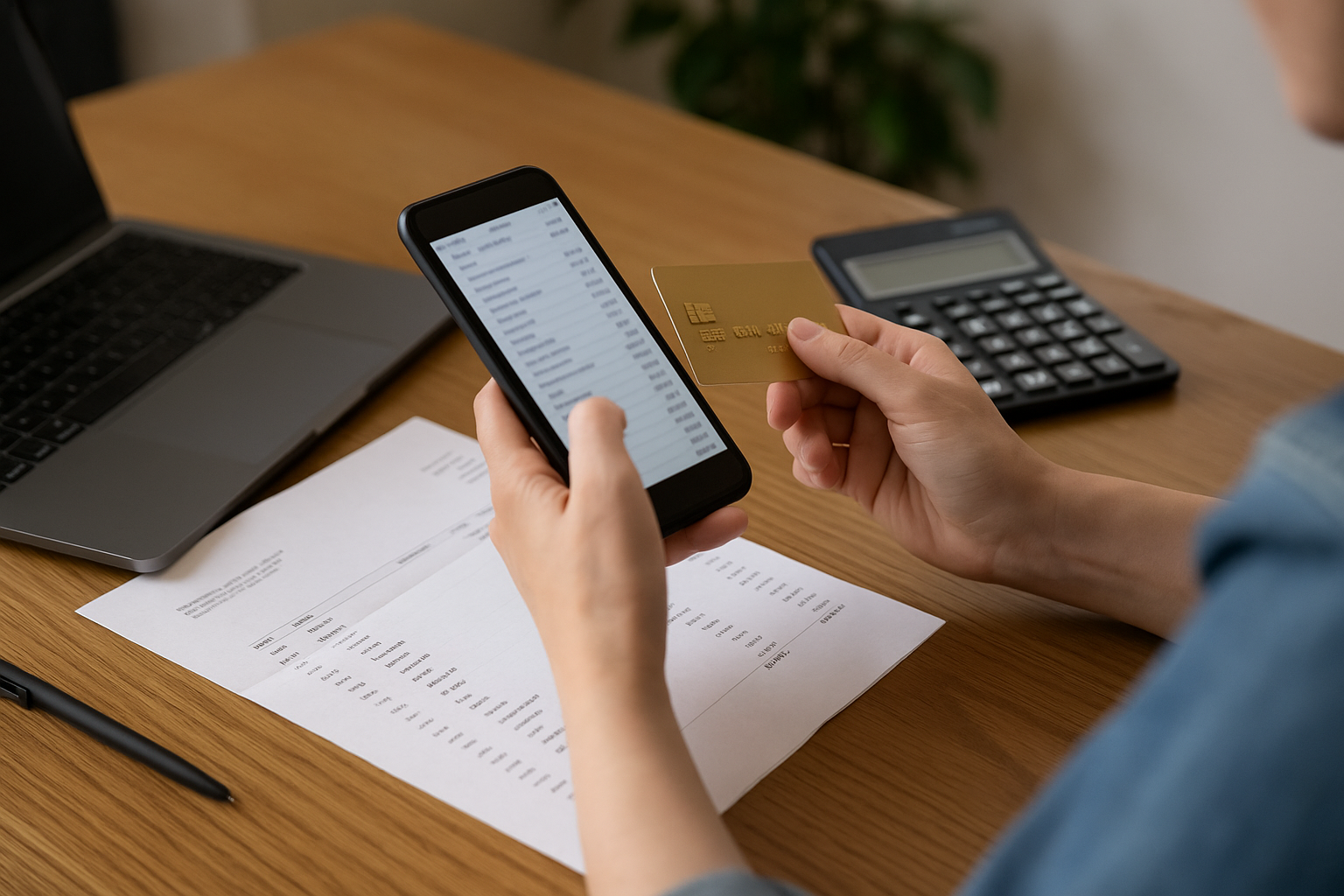Discovering unauthorized charges on your credit card can be a daunting experience that leaves you feeling vulnerable and anxious. These unexpected transactions can disrupt your financial peace of mind and require a timely, informed response. Knowing how to navigate this situation is essential for minimizing potential losses and regaining control over your finances.
Financial security is crucial in today’s fast-paced world, and understanding how to handle unauthorized charges is a fundamental part of it. By staying informed and prepared, you can tackle these unforeseen challenges effectively. This comprehensive guide will walk you through the necessary steps, from recognizing unfamiliar charges to ensuring your credit card account remains secure.
Identify unauthorized charges early

The first step in dealing with unauthorized charges is identifying them promptly. Regularly monitoring your credit card statements is crucial for spotting any discrepancies as soon as they occur. By reviewing your transactions consistently, you can pinpoint any unfamiliar activities and take swift action to mitigate potential damage. Early detection not only helps in disputing these charges efficiently but also prevents further unauthorized transactions.
Checking your statements online can be particularly effective, as this method provides real-time access to your finances. Opt for receiving alerts on your mobile device for transactions exceeding a certain amount. These proactive steps can act as an early warning system, allowing you to catch suspicious charges immediately. Ensuring a habit of regular monitoring is key to maintaining a healthy credit card account.
Document the details
Once you notice an unauthorized charge, thoroughly document the issue before taking any steps to resolve it. Collect all relevant information, including transaction dates, amounts, and any associated merchant details. Keeping an organized record is essential for supporting your case when disputing unauthorized charges. This evidence can streamline the process and facilitate a quicker resolution in your favor.
Consider maintaining a digital or physical log of these unwarranted transactions. Having a clear, concise documentation trail simplifies communication with your credit card company. Such a log can be instrumental if the issue persists or escalates, ensuring that you have all necessary data at your fingertips. Adequate record-keeping substantiates your claims and aids in effective dispute resolution.
Contact your credit card issuer
With your documentation ready, promptly contact your credit card issuer to report the unauthorized charges. Most companies have a dedicated fraud department equipped to handle such inquiries. Time is of the essence in these cases, as notifying your issuer quickly can prevent further unauthorized use and protect your account.
Reach out to your issuer via phone for immediate assistance, as this can expedite the resolution process. During this interaction, provide all the details collected to help the representative understand your situation fully. They’ll guide you through the next steps, which may include freezing your account, issuing a new card, or conducting an investigation. Effective communication with your credit card company is crucial for addressing the issue promptly.
Understand your rights and protections
Familiarizing yourself with the legal protections available to you is vital in disputing unauthorized charges successfully. Under U.S. Federal law, specifically the Fair Credit Billing Act, consumers are protected against unauthorized transactions, and liability is limited. Knowing your rights empowers you to act with confidence when tackling these financial challenges.
Typically, your liability for unauthorized credit card transactions is capped at $50. However, many credit card companies waive this fee entirely if the unauthorized charges are reported promptly. Understanding these protections reassures you as you navigate the dispute process, providing a framework within which your issue will be resolved. Comprehending these rights offers peace of mind and encourages proactive financial management.
Take additional preventive measures
While disputing unauthorized charges is crucial, taking preventive measures to protect your credit card information is equally important. Ensure that your online accounts are secured with strong, unique passwords and enable two-factor authentication wherever possible. Being vigilant about the sites where you input your credit card details can significantly reduce the risk of fraudulent charges.
Consider leveraging technology, such as password managers and security apps, to bolster your defenses. Regularly update your passwords and remain cautious of phishing scams and dubious links. By adopting these preventive practices, you fortify your financial security against potential threats, ensuring that you’re well-protected against unauthorized charges in the future.
Monitor your credit report
Monitoring your credit report regularly complements your efforts to combat unauthorized charges effectively. Obtain free credit reports annually from major credit bureaus and review them for suspicious activity. Looking beyond current charges, this practice helps you spot any unfamiliar accounts or credit inquiries that could indicate fraud.
Utilize credit monitoring services that offer real-time alerts for changes in your credit profile. Being proactive in monitoring not just your credit card statements but also your credit reports ensures a comprehensive approach to financial security. Staying informed about your credit status bolsters your defenses against potential misuse of your accounts and supports a healthy financial life.

